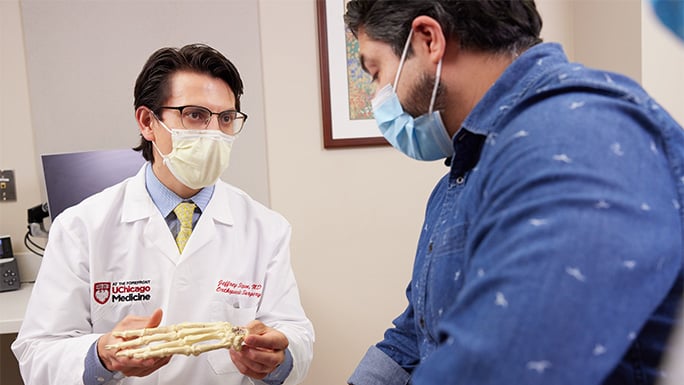Brachial Plexus and Peripheral Nerve Injury Clinic

Multidisciplinary Team for Comprehensive Nerve Damage Care
Nerve damage is complex, so our multidisciplinary nerve team, including orthopaedic surgeons, pain management, radiology, neurology and more, works closely together to diagnose and treat these nerve conditions. We will evaluate each patient’s condition(s), symptoms and overall outcome goals to determine which specialists will partner with our patients to develop a customized treatment plan that would best meet their specific needs.
Meet Our Comprehensive Nerve Team
Nerve Damage We Treat
Our team manages a wide range of nerve damage conditions that fall under two major types of nerve injuries:
- Motor Nerves: Motor nerves control muscle movements, such as walking, writing, sitting and standing, hand dexterity, and so much more. When motor nerves are damaged, you may experience muscle weakness, numbness or decreased mobility that can make common movements difficult.
- Sensory Nerves: Sensory nerves allow you to experience the five primary senses of touch, smell, taste, hearing and sight. With sensory nerve damage, the nerves that carry signals from the body to the brain are not functioning properly. This can result in a range of symptoms depending on the extent of damage, including numbness, tingling or burning sensations, loss of sensation, and difficulties with balance and coordination.
- Mixed Motor and Sensory Nerves: Many nerves contain both sensory and motor portions which can lead to a mix of motor and sensory damage.
Common Nerve Damage and Injuries We Treat:
- Brachial plexus neck and or shoulder nerve injury
- Erb’s Palsy
- Klumpke Palsy
- Saturday Night Palsy
- Radial nerve injury
- Median nerve injury
- Ulnar nerve injury
- Musculocutaneous nerve injury
- Femoral nerve injury
- Sciatic nerve injury
- Peroneal nerve injury
- Tibial nerve injury
What causes nerve damage and injures?
There are several causes of nerve damage, with the most common including:
- Trauma, such as accidents, falls and more, that can lead to a severed, cut or lacerated nerve.
- Neuroma, or a mass of nerve and scar tissue, develops after an injury that impedes function and causes pain.
Nerve Damage Symptoms
Injury or damage to nerves can come from cuts, bruises or compression, that lead to symptoms such as pain, weakness, loss of function, numbness, sensitivity to touch and more. It is important to pay attention to how your body and nerves are functioning, particularly if you experiencing:
- Weakness
- Muscle atrophy
- Twitching
- Paralysis
- Pain
- Sensitivity
- Numbness
- Burning
- Tingling
- Positional unawareness
If you have one or more of the following symptoms and suspect you have nerve damage, you should reach out to a nerve specialist to accurately diagnose your conditions in order to treat your condition, prevent further complications and improve overall quality of life.
Nonoperative Nerve Pain Treatment Options
You will work with a board-certified interventional pain specialist who will assist you in selecting the right treatment plan for you. We offer a wide range of options designed to help relieve pain related to your injury. Depending on your particular nerve pain, we might recommend:
Stellate Ganglion Nerve Blocks/Lumbar Sympathetic Nerve Blocks: These nerve blocks focus on decreasing the overactivity of the nerve(s) that is causing inflammation and swelling to one or more extremities.
Peripheral Nerve Blocks: With peripheral nerve blocks, we target a specific nerve (or set of nerves) and cut off the pain signal(s) from the nerve to the brain, decreasing pain and improve quality of life.
Neuromodulation: Neuromodulation uses electricity to help reprogram the way nerves send painful signals to your brain. Neuromodulation devices can be temporarily or permanently implanted based on your condition and specific needs. We offer the following neuromodulation techniques:
- Peripheral Nerve Stimulation
- Spinal Cord Stimulation
- Dorsal root ganglion stimulation
Surgical Nerve Damage Treatment
Our comprehensive nerve injury team offers the full scope of treatment options for nerve damage that are tailored to each patient’s personal diagnosis, symptoms and objectives, and we offer:
Direct Nerve Repair
If a nerve has been cut, direct nerve repair can be used to surgically restore function. During this procedure, any damaged nerve tissue will be removed, and the severed ends of the nerve will be sutured together.
Nerve Grafting
When a severed nerve is too damaged to connect through direct nerve repair, we offer nerve grafting. With nerve grafting, nerve tissue from another part of the body is used to bridge the gap between both damaged ends of the cut nerve to allow the nerve to regrow. Alternatively, a cadaver nerve (nerve allograft) can be used to bridge the gap.
Nerve Burying: Targeted Muscle Reinnervation (TMR) and Regenerative Peripheral Nerve Interphase (RPNI)
Painful neuromas, noncancerous nerve masses, can form on hands and feet and may not be ideal for nerve repair. If nerve repair is not possible, we can move the painful neuroma to grow into another muscle to prevent another neuroma from forming.
Tendon Transfer
Tendon transfer procedures are commonly used to restore function and movement if a nerve is injured and cannot be repaired. By using a healthy tendon from another part of the body, our surgeons can suture it to an unresponsive muscle to stimulate function in that location where the nerve damage occurred.
Nerve Transfer
Nerve transfer is a surgical technique used to restore nerve function after injury or paralysis. A nerve transfer uses a healthy nerve from a less critical muscle and connects it to a nonfunctioning, damaged nerve. The donor nerve will grow over the damaged nerve, allowing it to recover function and keep the muscles from atrophying.
Our Nerve Injury Clinic
Request an Appointment
We are currently experiencing a high volume of inquiries, leading to delayed response times. For faster assistance, please call 1-888-824-0200 to schedule your appointment.
If you have symptoms of an urgent nature, please call your doctor or go to the emergency room immediately.
* Indicates required field
